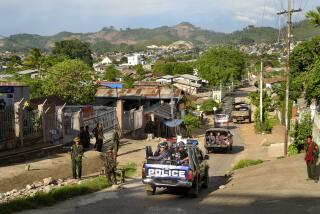Zairian Guerrillas Poised to Mount Attack on Capital
- Share via
NAIROBI, Kenya — The stunning capture by rebel forces of Zaire’s third-largest city was a humiliating setback for President Mobutu Sese Seko’s increasingly embattled regime and sets the stage for assaults on other key cities, including the capital.
The rebel triumph Saturday at Kisangani means the anti-Mobutu insurgents convincingly control more than one-fifth of one of Africa’s largest nations, including every major town and airport in the vast eastern region.
Initial reports Sunday indicated that the government’s much-vaunted defense of Kisangani, its last military stronghold in eastern Zaire and a strategic prize in the five-month war, crumbled into chaos even before the guerrillas reached the river port.
Diplomats, aid workers and others said Kisangani wasn’t taken so much as abandoned.
After a rebel artillery barrage late Friday night, demoralized Zairian army troops began shooting and ransacking shops, homes and relief agency warehouses in a wild looting rampage.
The soldiers then began fleeing with their families in canoes and on rafts across the broad Zaire River or in stolen vehicles. A plane took off shortly before midnight, reportedly carrying the provincial governor and other officials. Foreigners were evacuated by the French military early Saturday.
Heavily armed guerrillas from the Alliance of Democratic Forces for the Liberation of Congo-Zaire swept into the city Saturday afternoon with little opposition. Crowds of women reportedly sang, danced and embraced them as they advanced.
“The rebels just moved in to pick up the pieces,” a U.N. official here said. “We’ve seen this over and over. These cities aren’t falling. They’re being vacated.”
The fate of the so-called white legion of up to 300 Serbian mercenaries, who had been hired by the government to help lead a counteroffensive against the rebels, was unknown Sunday. There were unconfirmed reports that the mercenaries fought their erstwhile Zairian army allies. Other reports suggested that at least some soldiers had defected to the rebels.
Kisangani, a once-grand city of 400,000 people close to the continent’s geographic center, was reported quiet and calm Sunday. A long-standing nighttime curfew was lifted, and residents wore white headbands to show support for their new rulers.
The fall of Kisangani may have grave repercussions. Kinshasa, the capital, lies about 900 miles downstream on the Zaire River, the most important commercial artery in a country with few passable roads. That gives the rebels a direct, navigable route to the seat of power.
“We are now thinking of going up to Kinshasa,” rebel leader Laurent Kabila cheerfully told reporters in the rebel-held city of Goma, near the Rwandan border.
*
But a rebel spokesman, Raphael Ghenda, indicated that the guerrillas would first detour far to the southeast to Lubumbashi, the capital of mineral-rich Shaba province. The city, Zaire’s second largest, long has been a hotbed of political opposition to Mobutu’s despotic regime, and its mining of copper and cobalt is a key source of government revenue.
“Lubumbashi is the next big target,” Ghenda told reporters. “But all the towns of the republic are targets, including Kinshasa itself.”
Diplomats say the rebel drive is backed by exiled Zairian Katangese rebels who have returned to join in the fight to topple Mobutu. Many first fled to Angola in the 1960s and ‘70s after failed uprisings in Shaba. Uganda, Rwanda and Burundi are also believed to have backed the rebels with arms, training and logistic support.
Kinshasa was reported to be tense Sunday as nervous residents stocked up on food, candles and other supplies amid widespread fears that ill-disciplined Zairian troops would begin rioting. Rampaging soldiers have looted the capital twice in recent years, causing heavy damage.
Western embassies and Zairian newspapers said that a military coup by disgruntled officers was likely. But no unusual military movements were reported.
There was no official word from Mobutu, who has prostate cancer and has been in seclusion at his villa on the French Riviera for most of the last seven months.
Mobutu, 66, has ruled and plundered Zaire since seizing power in 1965, but his grip on the sprawling nation of 42 million people has grown increasingly weak. On Sunday, a spokesman said he had been admitted to a hospital in Monte Carlo for further cancer treatment.
“For a long time, Mobutu’s power has been an illusion,” said a Western diplomat with long experience in Zaire. “Kabila and his forces have shown what an illusion it all was.”
U.N. special envoy Mohammed Sahnoun met with Kabila on Saturday in an unsuccessful attempt to mediate a cease-fire. The government has said it is willing to accept a truce, but the rebels have demanded face-to-face meetings first with Mobutu.
More to Read
Sign up for Essential California
The most important California stories and recommendations in your inbox every morning.
You may occasionally receive promotional content from the Los Angeles Times.











